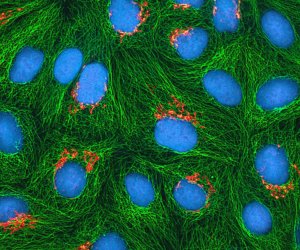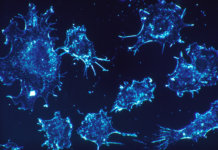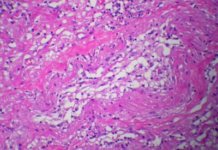Autophagy & longevity: a winning duo
In a recent study[1], a team of researchers at Brown University succeeded in strengthening the autophagy process in an animal model, the small C. elegans worm, giving it a longer lifespan. Autophagy is a conserved biological process that recycles damaged cell compounds, allowing the cell to fight cellular stress and cell death. This mechanism is governed by several cell signalling pathways, one of which involves a nuclear export protein (allowing proteins and RNA to pass between the nucleus and the cytoplasm), XPO1. Inhibition of this protein sequesters HLH-30, a transcription factor that regulates autophagy, within the nucleus and promotes its action on DNA[2].
A new way to induce autophagy
In this study, switching off the gene coding for XPO1 (xpo-1) led to improved autophagy and enrichment of the transcription factor HLH-30 in the nucleus. This transcription factor, by its role on autophagy, plays a role in extending the life span of many model organisms, including C. elegans, by triggering an appropriate response during stress (fasting, heat stress, bacterial infection…)[1]. C. elegans’ nuclear export protein XPO1 is the orthologue (the same protein for the same function in different species) of a protein preserved in humans, Exportin-1, and HLH-30 is a functional orthologue protein of TFEB[2]. TFEB coordinates the lysosomal proteins (the waste bins of our cells) and the genes involved in autophagy[3]. It would seem that the effects resulting from the inhibition of XPO1 are also preserved in humans, since analyses performed on HeLa cells showed that the concentration of TFEB in the nucleus as well as autophagy were increased following this inhibition[1].

Human applications?
Inhibiting the nuclear export protein XPO-1 in humans could be applied in therapy, against diseases characterized by lysosomal abnormalities and age-related autophagy abnormalities. This is the case of neurodegenerative diseases, caused by the accumulation of poorly folded protein aggregates and abnormal organelles in cells. There are reversible pharmacological inhibitors of XPO1 with good selectivity, bioavailability and a good toxicity profile for humans, whose tests on the C. elegans model have shown benefits on longevity[1].
Brown University researchers therefore found that genetically and pharmacologically inhibiting XPO1 significantly increased nuclear enrichment in HLH-30 and improved autophagy, resulting in proteostasis benefits and increased longevity. The study also highlights the therapeutic potential of targeting nuclear export proteins and transcription factors in humans to combat diseases associated with proteostasis decline, including age-related neurodegenerative diseases.
References :
[1] Silvestrini et al., 2018, Cell Reports 23, 1915–1921.
[2] Louis R. Lapierre, C Daniel De Magalhaes Filho, Philip R. McQuary, Chu-Chiao Chu, Orane Visvikis, Jessica T. Chang, Sara Gelino, Binnan Ong, Andrew E. Davis, Javier E. Irazoqui, Andrew Dillin and Malene Hansen. The TFEB orthologue HLH-30 regulates autophagy and modulates longevity in Caenorhabditis elegans, Nat Commun. 2013 ; 4: . doi:10.1038/ncomms3267.
[3] Gennaro Napolitano and Andrea Ballabio, TFEB at a glance, Journal of Cell Science (2016) 129, 2475-2481 doi:10.1242/jcs.146365.
Anne Fischer

Author
Auteur
Anne is studying medicine science at the Institute of Pharmaceutical and Biological Science in Lyon and she has graduated with a Bachelor’s degree in molecular and cellular biology at the University of Strasbourg.
More about the Long Long Life team
Anne étudie les sciences du médicament à l’Institut des Sciences Pharmaceutiques et Biologiques de Lyon. Elle est titulaire d’une licence en biologie moléculaire et cellulaire de l’Université de Strasbourg.
En savoir plus sur l’équipe de Long Long Life














